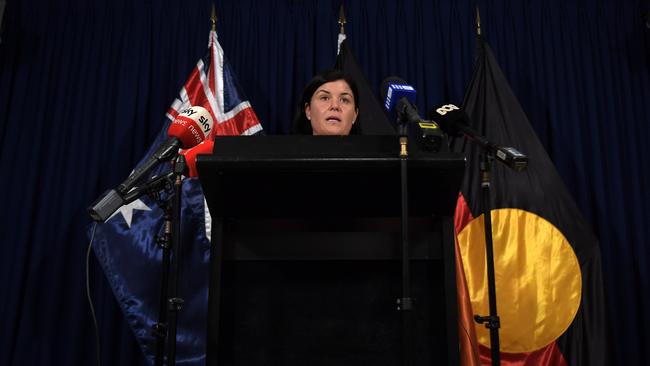Chief Minister Natasha Fyles to reinstate booze bans on advice from federal report
The NT government is set to bring forward legislation to reinstate dry zones in the Territory following recommendations from a federal report released on Monday. We reveal how it will work.
Northern Territory
Don't miss out on the headlines from Northern Territory. Followed categories will be added to My News.
The NT government is set to reinstate dry zones in town camps and communities through new legislation to be presented during sittings next week.
However, current restrictions on the sale of booze in Alice Springs will remain.
It follows the public release on Monday of a much-anticipated report, commissioned by the federal government, from Central Australian Regional Controller Dorelle Anderson into proposed actions to reduce alcohol-related harm following the end of alcohol restrictions under the Stronger Futures Act.
The NT government announced on Monday it would bring forward legislation to strengthen alcohol restrictions during NT parliament’s first sittings for the year.
Community Alcohol Plans will be developed for these communities and town camps that must be approved by the director of Liquor Licensing.
The legislation will apply to 96 Aboriginal communities across the Territory, 88 of which are already dry.
Communities that want to opt out of a dry zone will need 60 per cent of its voting population to support a tailored Community Alcohol Plan.
Local areas, like Alice Springs, will also be able to remain dry or select tailored restrictions.

Chief Minister Natasha Fyles said the current sales restrictions in Alice Springs would stay in place to provide immediate respite.
“We need that to continue,” Ms Fyles said.
“We’re seeing benefits from those short term restrictions.
“These measures have been coupled with increasing compliance tools, such as BDR blitz on premise and also our police blitzing with the Banned Drink Register.”
As part of the announcement made in Darwin on Monday, it was revealed the federal government will invest $250m in a plan for ‘A Better, Safer Future for Central Australia’.
The NT government will not contribute additional funds.
The plan will focus on improved community safety and cohesion, job creation, better services, investing in families, and on-ountry learning.
The federal government will also prevent and address issues caused by foetal alcohol spectrum disorders through the health and justice systems.
Ms Fyles denied the Northern Territory government had failed by allowing the Stronger Futures provisions to expire in July last year, which was followed by a surge in alcohol-related crime, particularly in Alice Springs.
“This isn’t Stronger Futures, this is Territory-based legislation,” she said.
“It’s trying to find that balance between respecting local community voices and there’ll be some people that will be disappointed with today’s announcement.
“It does provide a clear pathway allowing local leadership to come together around this issue and a clearly defined process.

“I’ve heard from the community that they want to see a stronger process that is defined. We’re not seeing criticims of the communities that have opted in. It’s around those voices we’ve listened to around not opting in and this defines that process.”
Ms Fyles said NT government policy recognised the harm caused by alcohol to the community while acknowledging also it’s a legal product.
“So we try and put in place policy and legislation that stops the supply to those people that cause harm,” she said.
Ms Fyles would not say specifically who the NT government had consulted with that supported looser alcohol laws despite a long list of organisations opposing the move, including Aboriginal Peak Organisations NT, Central Australian Aboriginal Congress, Indigenous federal politicians Marion Scrymgour and Jacinta Price, Alice Springs mayor Matt Paterson, Hospitality NT chief executive Alex Bruce and Danila Dilba health services.
The new measures are based on recommendations from Ms Anderson’s report, which stressed an “immediate need to address alcohol related issues through a combination of supply restrictions, greater compliance and an educative approach”.
“History shows that only addressing alcohol is a temporary solution to a complex, multifaceted, deep rooted issue. The immediated measures put in place will not alone see long term generational change.”

Ms Anderson said children “unanimously voiced their hatred of alcohol and the harm it inflicts on their families”.
“Their simple aspirations are to live in a ‘normal place’, have jobs when they are older and be able to support their families with basic needs. We need to listen to the most vulnerable in our community and act with urgency to address the current crisis but also tackle the extreme poverty and social disadvantage causal factors amongst this cohort.”
NT Opposition leader Lia Finocchiaro said the NT government had failed to protect Alice Springs.
“Today’s so-called plan by Natasha Fyles does nothing to address the issues in Central Australia,” Ms Finocchiaro said.
“People living in Alice Springs and communities right around that region will be left wondering what is going to be different tomorrow when they wake up and the answer to that question is absolutely nothing.
“What the Chief Minister highlighted was her inability to do her job and the fact that it’s taken so long to reach this point where there’s some level of backflip on her disastrous decision to end Stronger Futures without any plan in place just shows that this is a governmnt in crisis.
“Instead of dealing with the issue and putting people in Central Australia as a top priority and top of mind they’ve decided to put themselves and their own jobs first.”




